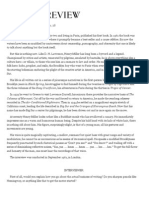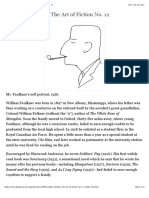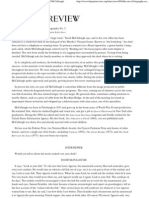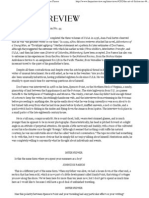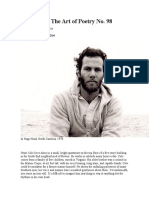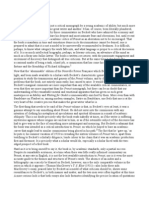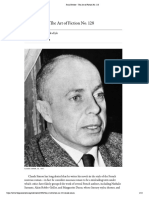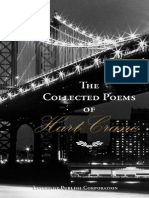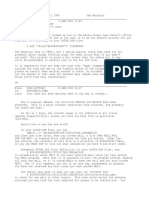The Paris Review Interview
The Paris Review Interview
Uploaded by
Sergio GutierrezCopyright:
Available Formats
The Paris Review Interview
The Paris Review Interview
Uploaded by
Sergio GutierrezOriginal Description:
Copyright
Available Formats
Share this document
Did you find this document useful?
Is this content inappropriate?
Copyright:
Available Formats
The Paris Review Interview
The Paris Review Interview
Uploaded by
Sergio GutierrezCopyright:
Available Formats
Paris Review - The Art of Fiction No. 76, Raymond C...
http://www.theparisreview.org/interviews/3059/the-ar...
Blog
Current Issue
Interviews
Archive
Subscribe
Store
About
Follow
Archive
Back Issues
Fiction
Poetry
Interviews
Letters & Essays
Art & Photography
Audio
About
History
Masthead
Jobs
Submissions
Events
Prizes
Media Kit
Support The Paris Review
Bookstores
Raymond Carver, The Art of Fiction No. 76
Interviewed by Mona Simpson, Lewis Buzbee
1 de 18
31/07/15 16:32
Paris Review - The Art of Fiction No. 76, Raymond C...
http://www.theparisreview.org/interviews/3059/the-ar...
Raymond Carver lives in a large, two-story, wood-shingled house on a quiet street in Syracuse, New York. The front law
down to the sidewalk. A new Mercedes sits in the driveway. An older VW, the other household car, gets parked on the street
The entrance to the house is through a large, screened-in porch. Inside, the furnishings are almost without character. Ev
matchescream-colored couches, a glass coffee table. Tess Gallagher, the writer with whom Raymond Carver lives, collects
feathers and sets them in vases throughout the housethe most noticeable decorative attempt. Our suspicions were confirm
told us that all the furniture was purchased and delivered in one day.
Gallagher has painted a detachable wood No Visitors sign, the lettering surrounded by yellow and orange eyelashes, whic
the screen door. Sometimes the phone is unplugged and the sign stays up for days at a time.
Carver works in a large room on the top floor. The surface of the long oak desk is clear; his typewriter is set to the side, o
L-shaped wing. There are no knicknacks, charms, or toys of any kind on Carver's desk. He is not a collector or a man prone
and nostalgia. Occasionally, one manila folder lies on the oak desk, containing the story currently in the process of revision.
well in order. He can extract a story and all its previous versions at a moment's notice. The walls of the study are painted wh
rest of the house, and, like the rest of the house, they are mostly bare. Through a high rectangular window above Carver's de
filters into the room in slanted beams, like light from high church windows.
Carver is a large man who wears simple clothesflannel shirts, khakis or jeans. He seems to live and dress as the charact
stories live and dress. For someone of his size, he has a remarkably low and indistinct voice; we found ourselves bending clos
minutes to catch his words and asking the irritating What, what?
Portions of the interview were conducted through the mail, during 19811982. When we met Carver, the No Visitors
up and several Syracuse students dropped by to visit during the course of the interview, including Carver's son, a senior. For
made us sandwiches with salmon he had caught off the coast of Washington. Both he and Gallagher are from Washington s
the time of the interview, they were having a house built in Port Angeles, where they plan to live part of each year. We asked
house would feel more like a home to him. He replied, No, wherever I am is fine. This is fine.
INTERVIEWER
What was your early life like, and what made you want to write?
RAYMOND CARVER
I grew up in a small town in eastern Washington, a place called Yakima. My dad worked at the sawmill there. He was a sa
helped take care of the saws that were used to cut and plane the logs. My mother worked as a retail clerk or a waitress or else
home, but she didn't keep any job for very long. I remember talk concerning her nerves. In the cabinet under the kitchen s
bottle of patent nerve medicine, and she'd take a couple of tablespoons of this every morning. My dad's nerve medicine wa
Most often he kept a bottle of it under that same sink, or else outside in the woodshed. I remember sneaking a taste of it onc
it, and wondering how anybody could drink the stuff. Home was a little two-bedroom house. We moved a lot when I was a
always into another little two-bedroom house. The first house I can remember living in, near the fairgrounds in Yakima, had
toilet. This was in the late 1940s. I was eight or ten years old then. I used to wait at the bus stop for my dad to come home fr
2 de 18
31/07/15 16:32
Paris Review - The Art of Fiction No. 76, Raymond C...
http://www.theparisreview.org/interviews/3059/the-ar...
Usually he was as regular as clockwork. But every two weeks or so, he wouldn't be on the bus. I'd stick around then and wait
bus, but I already knew he wasn't going to be on that one, either. When this happened, it meant he'd gone drinking with frie
from the sawmill. I still remember the sense of doom and hopelessness that hung over the supper table when my mother and
brother sat down to eat.
INTERVIEWER
But what made you want to write?
CARVER
The only explanation I can give you is that my dad told me lots of stories about himself when he was a kid, and about hi
grandfather. His grandfather had fought in the Civil War. He fought for both sides! He was a turncoat. When the South beg
war, he crossed over to the North and began fighting for the Union forces. My dad laughed when he told this story. He didn
anything wrong with it, and I guess I didn't either. Anyway, my dad would tell me stories, anecdotes really, no moral to them
tramping around in the woods, or else riding the rails and having to look out for railroad bulls. I loved his company and love
him tell me these stories. Once in a while he'd read something to me from what he was reading. Zane Grey westerns. These w
real hardback books, outside of grade-school texts, and the Bible, that I'd ever seen. It wouldn't happen very often, but now a
see him lying on the bed of an evening and reading from Zane Grey. It seemed a very private act in a house and family that w
to privacy. I realized that he had this private side to him, something I didn't understand or know anything about, but someth
found expression through this occasional reading. I was interested in that side of him and interested in the act itself. I'd ask h
me what he was reading, and he'd oblige by just reading from wherever he happened to be in the book. After a while he'd say
do something else now. Well, there were plenty of things to do. In those days, I went fishing in this creek that was not too fa
house. A little later, I started hunting ducks and geese and upland game. That's what excited me in those days, hunting and f
what made a dent in my emotional life, and that's what I wanted to write about. My reading fare in those days, aside from an
historical novel or Mickey Spillane mystery, consisted of Sports Afield and Outdoor Life, and Field & Stream. I wrote a longis
the fish that got away, or the fish I caught, one or the other, and asked my mother if she would type it up for me. She couldn
she did go rent a typewriter, bless her heart, and between the two of us, we typed it up in some terrible fashion and sent it ou
remember there were two addresses on the masthead of the outdoors magazine; so we sent it to the office closest to us, to Bo
Colorado, the circulation department. The piece came back, finally, but that was fine. It had gone out in the world, that man
had been places. Somebody had read it besides my mother, or so I hoped anyway. Then I saw an ad in Writer's Digest
of a man, a successful author, obviously, testifying to something called the Palmer Institute of Authorship. That seemed like
for me. There was a monthly payment plan involved. Twenty dollars down, ten or fifteen dollars a month for three years or t
one of those things. There were weekly assignments with personal responses to the assignments. I stayed with it for a few mo
maybe I got bored; I stopped doing the work. My folks stopped making the payments. Pretty soon a letter arrived from the P
Institute telling me that if I paid them up in full, I could still get the certificate of completion. This seemed more than fair. S
talked my folks into paying the rest of the money, and in due time I got the certificate and hung it up on my bedroom wall. B
through high school it was assumed that I'd graduate and go to work at the sawmill. For a long time I wanted to do the kind
dad did. He was going to ask his foreman at the mill to put me on after I graduated. So I worked at the mill for about six mo
hated the work and knew from the first day I didn't want to do that for the rest of my life. I worked long enough to save the
car, buy some clothes, and so I could move out and get married.
3 de 18
31/07/15 16:32
Paris Review - The Art of Fiction No. 76, Raymond C...
http://www.theparisreview.org/interviews/3059/the-ar...
INTERVIEWER
Somehow, for whatever reasons, you went to college. Was it your wife who wanted you to go on to college? Did she enco
this respect? Did she want to go to college and that made you want to go? How old were you at this point? She must have b
young, too.
CARVER
I was eighteen. She was sixteen and pregnant and had just graduated from an Episcopalian private school for girls in Wa
Washington. At school she'd learned the right way to hold a teacup; she'd had religious instruction and gym and such, but sh
learned about physics and literature and foreign languages. I was terrifically impressed that she knew Latin. Latin! She tried
go to college during those first years, but it was too hard to do that; it was impossible to do that and raise a family and be bro
time, too. I mean broke. Her family didn't have any money. She was going to that school on a scholarship. Her mother hated
does. My wife was supposed to graduate and go on to the University of Washington to study law on a fellowship. Instead, I m
pregnant, and we got married and began our life together. She was seventeen when the first child was born, eighteen when t
born. What shall I say at this point? We didn't have any youth. We found ourselves in roles we didn't know how to play. But
best we could. Better than that, I want to think. She did finish college finally. She got her B.A. degree at San Jose State twelv
years after we married.
INTERVIEWER
Were you writing during these early, difficult years?
CARVER
I worked nights and went to school days. We were always working. She was working and trying to raise the kids and man
household. She worked for the telephone company. The kids were with a babysitter during the day. Finally, I graduated with
degree from Humboldt State College and we put everything into the car and in one of those carryalls that fits on top of you
went to Iowa City. A teacher named Dick Day at Humboldt State had told me about the Iowa Writers' Workshop. Day had
story of mine and three or four poems to Don Justice, who was responsible for getting me a five-hundred-dollar grant at Iow
INTERVIEWER
Five hundred dollars?
CARVER
That's all they had, they said. It seemed like a lot at the time. But I didn't finish at Iowa. They offered me more money to
second year, but we just couldn't do it. I was working in the library for a dollar or two an hour, and my wife was working as a
was going to take me another year to get a degree, and we just couldn't stick it out. So we moved back to California. This tim
Sacramento. I found work as a night janitor at Mercy Hospital. I kept the job for three years. It was a pretty good job. I only
two or three hours a night, but I was paid for eight hours. There was a certain amount of work that had to get done, but onc
that was itI could go home or do anything I wanted. The first year or two I went home every night and would be in bed a
hour and be able to get up in the morning and write. The kids would be off at the babysitter's and my wife would have gone
4 de 18
31/07/15 16:32
Paris Review - The Art of Fiction No. 76, Raymond C...
http://www.theparisreview.org/interviews/3059/the-ar...
door-to-door sales job. I'd have all day in front of me. This was fine for a while. Then I began getting off work at night and g
instead of going home. By this time it was 1967 or 1968.
INTERVIEWER
When did you first get published?
CARVER
When I was an undergraduate at Humboldt State in Arcata, California. One day, I had a short story taken at one magaz
poem taken at another. It was a terrific day! Maybe one of the best days ever. My wife and I drove around town and showed
acceptance to all of our friends. It gave some much-needed validation to our lives.
INTERVIEWER
What was the first story you ever published? And the first poem?
CARVER
It was a story called Pastoral and it was published in the Western Humanities Review. It's a good literary magazine and
published by the University of Utah. They didn't pay me anything for the story, but that didn't matter. The poem was called
Ring, and it was published by a magazine in Arizona, now defunct, called Targets. Charles Bukowski had a poem in the sam
was pleased to be in the same magazine with him. He was a kind of hero to me then.
INTERVIEWER
Is it truea friend of yours told me this that you celebrated your first publication by taking the magazine to bed with
CARVER
That's partly true. Actually, it was a book, the Best American Short Stories annual. My story Will You Please Be Quiet, P
just appeared in the collection. That was back in the late sixties, when it was edited every year by Martha Foley and people u
thatsimply, The Foley Collection. The story had been published in an obscure little magazine out of Chicago called
day the anthology came in the mail I took it to bed to read and just to look at, you know, and hold it, but I did more looking
than actual reading. I fell asleep and woke up the next morning with the book there in bed beside me, along with my wife.
INTERVIEWER
In an article you did for The New York Times Book Review you mentioned a story too tedious to talk about hereabo
choose to write short stories over novels. Do you want to go into that story now?
CARVER
The story that was too tedious to talk about has to do with a number of things that aren't very pleasant to talk about. I
talk about some of these things in the essay Fires, which was published in Antaeus. In it I said that finally, a writer is judged
5 de 18
31/07/15 16:32
Paris Review - The Art of Fiction No. 76, Raymond C...
http://www.theparisreview.org/interviews/3059/the-ar...
writes, and that's the way it should be. The circumstances surrounding the writing are something else, something extraliterar
ever asked me to be a writer. But it was tough to stay alive and pay bills and put food on the table and at the same time to thi
as a writer and to learn to write. After years of working crap jobs and raising kids and trying to write, I realized I needed to w
could finish and be done with in a hurry. There was no way I could undertake a novel, a two- or three-year stretch of work o
project. I needed to write something I could get some kind of a payoff from immediately, not next year, or three years from n
poems and stories. I was beginning to see that my life was notlet's say it was not what I wanted it to be. There was always a
of frustration to deal withwanting to write and not being able to find the time or the place for it. I used to go out and sit i
try to write something on a pad on my knee. This was when the kids were in their adolescence. I was in my late twenties or e
We were still in a state of penury, we had one bankruptcy behind us, and years of hard work with nothing to show for it exce
a rented house, and new creditors on our backs. It was depressing, and I felt spiritually obliterated. Alcohol became a proble
less gave up, threw in the towel, and took to full-time drinking as a serious pursuit. That's part of what I was talking about w
talking about things too tedious to talk about.
INTERVIEWER
Could you talk a little more about the drinking? So many writers, even if they're not alcoholics, drink so much.
CARVER
Probably not a whole lot more than any other group of professionals. You'd be surprised. Of course there's a mythology t
along with the drinking, but I was never into that. I was into the drinking itself. I suppose I began to drink heavily after I'd r
the things I'd wanted most in life for myself and my writing, and my wife and children, were simply not going to happen. It's
never start out in life with the intention of becoming a bankrupt or an alcoholic or a cheat and a thief. Or a liar.
INTERVIEWER
And you were all those things?
CARVER
I was. I'm not any longer. Oh, I lie a little from time to time, like everyone else.
INTERVIEWER
How long since you quit drinking?
CARVER
June second, 1977. If you want the truth, I'm prouder of that, that I've quit drinking, than I am of anything in my life. I'
alcoholic. I'll always be an alcoholic, but I'm no longer a practicing alcoholic.
INTERVIEWER
How bad did the drinking get?
6 de 18
31/07/15 16:32
Paris Review - The Art of Fiction No. 76, Raymond C...
http://www.theparisreview.org/interviews/3059/the-ar...
CARVER
It's very painful to think about some of the things that happened back then. I made a wasteland out of everything I touc
might add that towards the end of the drinking there wasn't much left anyway. But specific things? Let's just say, on occasion
were involved and emergency rooms and courtrooms.
INTERVIEWER
How did you stop? What made you able to stop?
CARVER
The last year of my drinking, 1977, I was in a recovery center twice, as well as one hospital; and I spent a few days in a p
DeWitt near San Jose, California. DeWitt used to be, appropriately enough, a hospital for the criminally insane. Toward the
drinking career I was completely out of control and in a very grave place. Blackouts, the whole businesspoints where you c
remember anything you say or do during a certain period of time. You might drive a car, give a reading, teach a class, set a bro
to bed with someone, and not have any memory of it later. You're on some kind of automatic pilot. I have an image of myself
living room with a glass of whiskey in my hand and my head bandaged from a fall caused by an alcoholic seizure. Crazy! Tw
was back in a recovery center, this time at a place called Duffy's, in Calistoga, California, up in the wine country. I was at Du
different occasions; in the place called DeWitt, in San Jose; and in a hospital in San Franciscoall in the space of twelve mo
that's pretty bad. I was dying from it, plain and simple, and I'm not exaggerating.
INTERVIEWER
What brought you to the point where you could stop drinking for good?
CARVER
It was late May 1977. I was living by myself in a house in a little town in northern California, and I'd been sober for abou
weeks. I drove to San Francisco, where they were having this publishers' convention. Fred Hills, at that time editor in chief a
McGraw-Hill, wanted to take me to lunch and offer me money to write a novel. But a couple of nights before the lunch, one
friends had a party. Midway through, I picked up a glass of wine and drank it, and that's the last thing I remember. Blackout
next morning when the stores opened, I was waiting to buy a bottle. The dinner that night was a disaster; it was terrible, peo
quarreling and disappearing from the table. And the next morning I had to get up and go have this lunch with Fred Hills. I w
hungover when I woke up I could hardly hold my head up. But I drank a half pint of vodka before I picked up Hills and tha
the short run. And then he wanted to drive over to Sausalito for lunch! That took us at least an hour in heavy traffic, and I w
hungover both, you understand. But for some reason he went ahead and offered me this money to write a novel.
INTERVIEWER
Did you ever write the novel?
CARVER
7 de 18
31/07/15 16:32
Paris Review - The Art of Fiction No. 76, Raymond C...
http://www.theparisreview.org/interviews/3059/the-ar...
Not yet! Anyway, I managed to get out of San Francisco back up to where I lived. I stayed drunk for a couple more days.
woke up, feeling terrible, but I didn't drink anything that morning. Nothing alcoholic, I mean. I felt terrible physicallyme
coursebut I didn't drink anything. I didn't drink for three days, and when the third day had passed, I began to feel some b
just kept not drinking. Gradually I began to put a little distance between myself and the booze. A week. Two weeks. Sudden
month. I'd been sober for a month, and I was slowly starting to get well.
INTERVIEWER
Did AA help?
CARVER
It helped a lot. I went to at least one and sometimes two meetings a day for the first month.
INTERVIEWER
Did you ever feel that alcohol was in any way an inspiration? I'm thinking of your poem Vodka, published in
CARVER
My God, no! I hope I've made that clear. Cheever remarked that he could always recognize an alcoholic line in a write
not exactly sure what he meant by this but I think I know. When we were teaching in the Iowa Writers' Workshop in the fal
1973, he and I did nothing but drink. I mean we met our classes, in a manner of speaking. But the entire time we were there
living in this hotel they have on campus, the Iowa HouseI don't think either of us ever took the covers off our typewriters
trips to a liquor store twice a week in my car.
INTERVIEWER
To stock up?
CARVER
Yes, stock up. But the store didn't open until 10:00 a.m. Once we planned an early morning run, a ten o'clock run, and w
to meet in the lobby of the hotel. I came down early to get some cigarettes and John was pacing up and down in the lobby. H
wearing loafers, but he didn't have any socks on. Anyway, we headed out a little early. By the time we got to the liquor store t
just unlocking the front door. On this particular morning, John got out of the car before I could get it properly parked. By t
inside the store he was already at the checkout stand with a half gallon of Scotch. He lived on the fourth floor of the hotel an
the second. Our rooms were identical, right down to the same reproduction of the same painting hanging on the wall. But w
drank together, we always drank in his room. He said he was afraid to come down to drink on the second floor. He said ther
chance of him getting mugged in the hallway! But you know, of course, that fortunately, not too long after Cheever left Iow
went to a treatment center and got sober and stayed sober until he died.
INTERVIEWER
Do you feel the spoken confessions at Alcoholics Anonymous meetings have influenced your writing?
8 de 18
31/07/15 16:32
Paris Review - The Art of Fiction No. 76, Raymond C...
http://www.theparisreview.org/interviews/3059/the-ar...
CARVER
There are different kinds of meetingsspeaker meetings where just one speaker will get up and talk for fifty minutes or
what it was like then, and maybe what it's like now. And there are meetings where everyone in the room has a chance to say s
But I can't honestly say I've ever consciously or otherwise patterned any of my stories on things I've heard at the meetings.
INTERVIEWER
Where do your stories come from, then? I'm especially asking about the stories that have something to do with drinking
CARVER
The fiction I'm most interested in has lines of reference to the real world. None of my stories really happened, of course.
always something, some element, something said to me or that I witnessed, that may be the starting place. Here's an example
last Christmas you'll ever ruin for us! I was drunk when I heard that, but I remembered it. And later, much later, when I wa
only that one line and other things I imagined, imagined so accurately that they could have happened, I made a storyA Se
But the fiction I'm most interested in, whether it's Tolstoy's fiction, Chekhov, Barry Hannah, Richard Ford, Hemingway, Isa
Ann Beattie, or Anne Tyler, strikes me as autobiographical to some extent. At the very least it's referential. Stories long or sh
come out of thin air. I'm reminded of a conversation involving John Cheever. We were sitting around a table in Iowa City w
people and he happened to remark that after a family fracas at his home one night, he got up the next morning and went int
bathroom to find something his daughter had written in lipstick on the bathroom mirror: D-e-r-e daddy, don't leave us. So
table spoke up and said, I recognize that from one of your stories. Cheever said, Probably so. Everything I write is autobio
Now of course that's not literally true. But everything we write is, in some way, autobiographical. I'm not in the least bothere
autobiographical fiction. To the contrary. On the Road. Cline. Roth. Lawrence Durrell in The Alexandria Quartet
Hemingway in the Nick Adams stories. Updike, too, you bet. Jim McConkey. Clark Blaise is a contemporary writer whose f
out-and-out autobiography. Of course, you have to know what you're doing when you turn your life's stories into fiction. Yo
immensely daring, very skilled and imaginative and willing to tell everything on yourself. You're told time and again when yo
write about what you know, and what do you know better than your own secrets? But unless you're a special kind of writer, a
talented one, it's dangerous to try and write volume after volume on The Story of My Life. A great danger, or at least a great
for many writers is to become too autobiographical in their approach to their fiction. A little autobiography and a lot of ima
best.
INTERVIEWER
Are your characters trying to do what matters?
CARVER
I think they are trying. But trying and succeeding are two different matters. In some lives, people always succeed; and I t
grand when that happens. In other lives, people don't succeed at what they try to do, at the things they want most to do, the
things that support the life. These lives are, of course, valid to write about, the lives of the people who don't succeed. Most o
experience, direct or indirect, has to do with the latter situation. I think most of my characters would like their actions to co
something. But at the same time they've reached the pointas so many people dothat they know it isn't so. It doesn't add
9 de 18
31/07/15 16:32
Paris Review - The Art of Fiction No. 76, Raymond C...
http://www.theparisreview.org/interviews/3059/the-ar...
longer. The things you once thought important or even worth dying for aren't worth a nickel now. It's their lives they've bec
uncomfortable with, lives they see breaking down. They'd like to set things right, but they can't. And usually they do know i
after that they just do the best they can.
INTERVIEWER
Could you say something about one of my favorite stories in your most recent collection? Where did the idea for Why
Dance? originate?
CARVER
I was visiting some writer friends in Missoula back in the mid-1970s. We were all sitting around drinking and someone t
about a barmaid named Linda who got drunk with her boyfriend one night and decided to move all of her bedroom furnish
backyard. They did it, too, right down to the carpet and the bedroom lamp, the bed, the nightstand, everything. There were
or five writers in the room, and after the guy finished telling the story, someone said, Well, who's going to write it? I don't
else might have written it, but I wrote it. Not then, but later. About four or five years later, I think. I changed and added thin
course. Actually, it was the first story I wrote after I finally stopped drinking.
INTERVIEWER
What are your writing habits like? Are you always working on a story?
CARVER
When I'm writing, I write every day. It's lovely when that's happening. One day dovetailing into the next. Sometimes I d
know what day of the week it is. The paddle-wheel of days, John Ashbery has called it. When I'm not writing, like now, wh
up with teaching duties as I have been the last while, it's as if I've never written a word or had any desire to write. I fall into b
stay up too late and sleep in too long. But it's okay. I've learned to be patient and to bide my time. I had to learn that a long t
Patience. If I believed in signs, I suppose my sign would be the sign of the turtle. I write in fits and starts. But when I'm writi
lot of hours at the desk, ten or twelve or fifteen hours at a stretch, day after day. I love that, when that's happening. Much of
time, understand, is given over to revising and rewriting. There's not much that I like better than to take a story that I've had
house for a while and work it over again. It's the same with the poems I write. I'm in no hurry to send something off just afte
and I sometimes keep it around the house for months doing this or that to it, taking this out and putting that in. It doesn't ta
to do the first draft of the story, that usually happens in one sitting, but it does take a while to do the various versions of the
done as many as twenty or thirty drafts of a story. Never less than ten or twelve drafts. It's instructive, and heartening both, t
early drafts of great writers. I'm thinking of the photographs of galleys belonging to Tolstoy, to name one writer who loved t
mean, I don't know if he loved it or not, but he did a great deal of it. He was always revising, right down to the time of page
went through and rewrote War and Peace eight times and was still making corrections in the galleys. Things like this should
writer whose first drafts are dreadful, like mine are.
INTERVIEWER
Describe what happens when you write a story.
10 de 18
31/07/15 16:32
Paris Review - The Art of Fiction No. 76, Raymond C...
http://www.theparisreview.org/interviews/3059/the-ar...
CARVER
I write the first draft quickly, as I said. This is most often done in longhand. I simply fill up the pages as rapidly as I can.
there's a kind of personal shorthand, notes to myself for what I will do later when I come back to it. Some scenes I have to le
unfinished, unwritten in some cases; the scenes that will require meticulous care later. I mean all of it requires meticulous ca
scenes I save until the second or third draft, because to do them and do them right would take too much time on the first dr
first draft it's a question of getting down the outline, the scaffolding of the story. Then on subsequent revisions I'll see to the
When I've finished the longhand draft I'll type a version of the story and go from there. It always looks different to me, bett
after it's typed up. When I'm typing the first draft, I'll begin to rewrite and add and delete a little then. The real work comes
I've done three or four drafts of the story. It's the same with the poems, only the poems may go through forty or fifty drafts.
told me he sometimes writes a hundred or so drafts of his poems. Can you imagine?
INTERVIEWER
Has your way of working changed?
CARVER
The stories in What We Talk About are different to an extent. For one thing, it's a much more self-conscious book in the
intentional every move was, how calculated. I pushed and pulled and worked with those stories before they went into the bo
extent I'd never done with any other stories. When the book was put together and in the hands of my publisher, I didn't writ
all for six months. And then the first story I wrote was Cathedral, which I feel is totally different in conception and execut
stories that have come before. I suppose it reflects a change in my life as much as it does in my way of writing. When I wrote
experienced this rush and I felt, This is what it's all about, this is the reason we do this. It was different than the stories tha
before. There was an opening up when I wrote the story. I knew I'd gone as far the other way as I could or wanted to go, cutt
everything down to the marrow, not just to the bone. Any farther in that direction and I'd be at a dead endwriting stuff an
stuff I wouldn't want to read myself, and that's the truth. In a review of the last book, somebody called me a minimalist wr
reviewer meant it as a compliment. But I didn't like it. There's something about minimalist that smacks of smallness of visi
execution that I don't like. But all of the stories in the new book, the one called Cathedral, were written within an eighteen-m
and in every one of them I feel this difference.
INTERVIEWER
Do you have any sense of an audience? Updike described his ideal reader as a young boy in a small Midwestern town fin
his books on a library shelf.
CARVER
It's nice to think of Updike's idealized reader. But except for the early stories, I don't think it's a young boy in a small Mid
town who's reading Updike. What would this young boy make of The Centaur or Couples or Rabbit Redux or The Coup
is writing for the audience that John Cheever said he was writing for, intelligent, adult men and women, wherever they live
worth his salt writes as well and as truly as he can and hopes for as large and perceptive a readership as possible. So you write
can and hope for good readers. But I think you're also writing for other writers to an extentthe dead writers whose work y
11 de 18
31/07/15 16:32
Paris Review - The Art of Fiction No. 76, Raymond C...
http://www.theparisreview.org/interviews/3059/the-ar...
well as the living writers you like to read. If they like it, the other writers, there's a good chance other intelligent, adult men
may like it, too. But I don't have that boy you mentioned in mind, or anyone else for that matter, when I'm doing the writing
INTERVIEWER
How much of what you write do you finally throw away?
CARVER
Lots. If the first draft of the story is forty pages long, it'll usually be half that by the time I'm finished with it. And it's no
question of taking out or bringing it down. I take out a lot, but I also add things and then add some more and take out some
something I love to do, putting words in and taking words out.
INTERVIEWER
Has the process of revision changed now that the stories seem to be longer and more generous?
CARVER
Generous, yes, that's a good word for them. Yes, and I'll tell you why. Up at school there's a typist who has one of those s
typewriters, a word processor, and I can give her a story to type and once she has it typed and I get back the fair copy, I can m
my heart's content and give it back to her; and the next day I can have my story back, all fair copy once more. Then I can ma
as much as I want, and the next day I'll have back a fair copy once more. I love it. It may seem like a small thing, really, but it
life, that woman and her word processor.
INTERVIEWER
Did you ever have any time off from not having to earn a living?
CARVER
I had a year once. It was a very important year for me, too. I wrote most of the stories in Will You Please Be Quiet
It was back in 1970 or 1971. I was working for this textbook publishing firm in Palo Alto. It was my first white-collar job, ri
period when I'd been a janitor at the hospital in Sacramento. I'd been working away there quietly as an editor when the com
called SRA, decided to do a major reorganization. I planned to quit, I was writing my letter of resignation, but then suddenl
fired. It was just wonderful the way it turned out. We invited all of our friends that weekend and had a firing party! For a yea
have to work. I drew unemployment and had my severance pay to live on. And that's the period when my wife finished her c
That was a turning point, that time. It was a good period.
INTERVIEWER
Are you religious?
CARVER
12 de 18
31/07/15 16:32
Paris Review - The Art of Fiction No. 76, Raymond C...
http://www.theparisreview.org/interviews/3059/the-ar...
No, but I have to believe in miracles and the possibility of resurrection. No question about that. Every day that I wake u
wake up. That's why I like to wake up early. In my drinking days I would sleep until noon or whatever and I would usually w
the shakes.
INTERVIEWER
Do you regret a lot of things that happened back then when things were so bad?
CARVER
I can't change anything now. I can't afford to regret. That life is simply gone now, and I can't regret its passing. I have to l
present. The life back then is gone just as surelyit's as remote to me as if it had happened to somebody I read about in a ni
century novel. I don't spend more than five minutes a month in the past. The past really is a foreign country, and they do do
differently there. Things happen. I really do feel I've had two different lives.
INTERVIEWER
Can you talk a little about literary influences, or at least name some writers whose work you greatly admire?
CARVER
Ernest Hemingway is one. The early stories. Big Two-Hearted River, Cat in the Rain, The Three-Day Blow, Soldi
lots more. Chekhov. I suppose he's the writer whose work I most admire. But who doesn't like Chekhov? I'm talking about h
now, not the plays. His plays move too slowly for me. Tolstoy. Any of his short stories, novellas, and Anna Karenina
Too slow. But The Death of Ivan Ilyich, Master and Man, How Much Land Does a Man Need? Tolstoy is the best there is.
Flannery O'Connor, Frank O'Connor. James Joyce's Dubliners. John Cheever. Madame Bovary. Last year I reread that book
new translation of Flaubert's letters written while he was composingno other word for itMadame Bovary. Conrad. Upd
to Go. And there are wonderful writers I've come across in the last year or two like Tobias Wolff. His book of stories
North American Martyrs is just wonderful. Max Schott. Bobbie Ann Mason. Did I mention her? Well, she's good and worth
twice. Harold Pinter. V. S. Pritchett. Years ago I read something in a letter by Chekhov that impressed me. It was a piece of a
of his many correspondents, and it went something like this: Friend, you don't have to write about extraordinary people who
extraordinary and memorable deeds. (Understand I was in college at the time and reading plays about princes and dukes and
overthrow of kingdoms. Quests and the like, large undertakings to establish heroes in their rightful places. Novels with large
heroes.) But reading what Chekhov had to say in that letter, and in other letters of his as well, and reading his stories, made m
differently than I had before. Not long afterwards I read a play and a number of stories by Maxim Gorky, and he simply rein
work what Chekhov had to say. Richard Ford is another fine writer. He's primarily a novelist, but he's also written stories an
a friend. I have a lot of friends who are good friends, and some of them are good writers. Some not so good.
INTERVIEWER
What do you do in that case? I mean, how do you handle thatif one of your friends publishes something you don't lik
CARVER
13 de 18
31/07/15 16:32
Paris Review - The Art of Fiction No. 76, Raymond C...
http://www.theparisreview.org/interviews/3059/the-ar...
I don't say anything unless the friend asks me, and I hope he doesn't. But if you're asked you have to say it in a way that it
the friendship. You want your friends to do well and write the best they can. But sometimes their work is a disappointment.
everything to go well for them, but you have this dread that maybe it won't and there's not much you can do.
INTERVIEWER
What do you think of moral fiction? I guess this has to lead into talk about John Gardner and his influence on you. I kn
his student many years ago at Humboldt State College.
CARVER
That's true. I've written about our relationship in the Antaeus piece and elaborated on it more in my introduction to a p
book of his called On Becoming a Novelist. I think On Moral Fiction is a wonderfully smart book. I don't agree with all of it,
but generally he's right. Not so much in his assessments of living writers as in the aims, the aspirations of the book. It's a boo
to affirm life rather than trash it. Gardner's definition of morality is life affirming. And in that regard he believes good fictio
fiction. It's a book to argue with, if you like to argue. It's brilliant, in any case. I think he may argue his case even better in
Novelist. And he doesn't go after other writers as he did in On Moral Fiction. We had been out of touch with each other for y
published On Moral Fiction, but his influence, the things he stood for in my life when I was his student, were still so strong t
while I didn't want to read the book. I was afraid to find out that what I'd been writing all these years was immoral! You und
we'd not seen each other for nearly twenty years and had only renewed our friendship after I'd moved to Syracuse and he wa
at Binghamton, seventy miles away. There was a lot of anger directed toward Gardner and the book when it was published.
nerves. I happen to think it's a remarkable piece of work.
INTERVIEWER
But after you read the book, what did you think then about your own work? Were you writing moral or immoral sto
CARVER
I'm still not sure! But I heard from other people, and then he told me himself, that he liked my work. Especially the new
pleases me a great deal. Read On Becoming a Novelist.
INTERVIEWER
Do you still write poetry?
CARVER
Some, but not enough. I want to write more. If too long a period of time goes by, six months or so, I get nervous if I have
any poems. I find myself wondering if I've stopped being a poet or stopped being able to write poetry. It's usually then that I
try to write some poems. This book of mine that's coming in the spring, Firesthat's got all of the poems of mine I want to
INTERVIEWER
How do they influence each other? The writing of fiction and the writing of poetry?
14 de 18
31/07/15 16:32
Paris Review - The Art of Fiction No. 76, Raymond C...
http://www.theparisreview.org/interviews/3059/the-ar...
CARVER
They don't any longer. For a long time I was equally interested in the writing of poetry and the writing of fiction. In mag
always turned to the poems first before I read the stories. Finally, I had to make a choice, and I came down on the side of the
was the right choice for me. I'm not a born poet. I don't know if I'm a born anything except a white American male. May
become an occasional poet. But I'll settle for that. That's better than not being any kind of poet at all.
INTERVIEWER
How has fame changed you?
CARVER
I feel uncomfortable with that word. You see, I started out with such low expectations in the first placeI mean, how fa
going to get in this life writing short stories? And I didn't have much self-esteem as a result of this drinking thing. So it's a co
amazement to me, this attention that's come along. But I can tell you that after the reception for What We Talk About
that I've never felt before. Every good thing that's happened since has conjoined to make me want to do even more and bette
been a good spur. And all this is coming at a time in my life when I have more strength than I've ever had before. Do you kn
saying? I feel stronger and more certain of my direction now than ever before. So fameor let's say this newfound attenti
interesthas been a good thing. It bolstered my confidence, when my confidence needed bolstering.
INTERVIEWER
Who reads your writing first?
CARVER
Tess Gallagher. As you know, she's a poet and short-story writer herself. I show her everything I write except for letters, a
shown her a few of those. But she has a wonderful eye and a way of feeling herself into what I write. I don't show her anythin
marked it up and taken it as far as I can. That's usually the fourth or fifth draft, and then she reads every subsequent draft th
far I've dedicated three books to her and those dedications are not just a token of love and affection; they also indicate the h
which I hold her and an acknowledgment of the help and inspiration she's given me.
INTERVIEWER
Where does Gordon Lish enter into this? I know he's your editor at Knopf.
CARVER
Just as he was the editor who began publishing my stories at Esquire back in the early 1970s. But we had a friendship tha
before that time, back to 1967 or 1968, in Palo Alto. He was working for a textbook publishing firm right across the street f
where I worked. The one that fired me. He didn't keep any regular office hours. He did most of his work for the company at
least once a week he'd ask me over to his place for lunch. He wouldn't eat anything himself, he'd just cook something for me
hover around the table watching me eat. It made me nervous, as you might imagine. I'd always wind up leaving something on
15 de 18
31/07/15 16:32
Paris Review - The Art of Fiction No. 76, Raymond C...
http://www.theparisreview.org/interviews/3059/the-ar...
and he'd always wind up eating it. Said it had to do with the way he was brought up. This is not an isolated example. He still
like that. He'll take me to lunch now and won't order anything for himself except a drink and then he'll eat up whatever I lea
plate! I saw him do it once in the Russian Tea Room. There were four of us for dinner, and after the food came he watched u
he saw we were going to leave food on our plates, he cleaned it right up. Aside from this craziness, which is more funny than
he's remarkably smart and sensitive to the needs of a manuscript. He's a good editor. Maybe he's a great editor. All I know fo
he's my editor and my friend, and I'm glad on both counts.
INTERVIEWER
Would you consider doing more movie script work?
CARVER
If the subject could be as interesting as this one I just finished with Michael Cimino on the life of Dostoyevsky, yes, of co
Otherwise, no. But Dostoyevsky! You bet I would.
INTERVIEWER
And there was real money involved.
CARVER
Yes.
INTERVIEWER
That accounts for the Mercedes.
CARVER
That's it.
INTERVIEWER
What about The New Yorker? Did you ever send your stories to The New Yorker when you were first starting out?
CARVER
No, I didn't. I didn't read The New Yorker. I sent my stories and poems to the little magazines and once in a while someth
accepted, and I was made happy by the acceptance. I had some kind of audience, you see, even though I never met any of my
INTERVIEWER
Do you get letters from people who've read your work?
CARVER
16 de 18
31/07/15 16:32
Paris Review - The Art of Fiction No. 76, Raymond C...
http://www.theparisreview.org/interviews/3059/the-ar...
Letters, tapes, sometimes photographs. Somebody just sent me a cassettesongs that had been made out of some of the
INTERVIEWER
Do you write better on the West Coastout in Washingtonor here in the East? I guess I'm asking how important a s
is to your work.
CARVER
Once, it was important to see myself as a writer from a particular place. It was important for me to be a writer from the W
that's not true any longer, for better or worse. I think I've moved around too much, lived in too many places, felt dislocated
to now have any firmly rooted sense of place. If I've ever gone about consciously locating a story in a particular place and p
guess I have, especially in the first book, I suppose that place would be the Pacific Northwest. I admire the sense of place in s
Jim Welch, Wallace Stegner, John Keeble, William Eastlake, and William Kittredge. There are plenty of good writers with t
place you're talking about. But the majority of my stories are not set in any specific locale. I mean, they could take place in ju
city or urban area; here in Syracuse, but also Tucson, Sacramento, San Jose, San Francisco, Seattle, or Port Angeles, Washing
case, most of my stories are set indoors!
INTERVIEWER
Do you work in a particular place in your house?
CARVER
Yes, upstairs in my study. It's important to me to have my own place. Lots of days go by when we just unplug the telepho
out our No Visitors. sign. For many years I worked at the kitchen table, or in a library carrel, or else out in my car. This roo
is a luxury and a necessity now.
INTERVIEWER
Do you still hunt and fish?
CARVER
Not so much anymore. I still fish a little, fish for salmon in the summer, if I'm out in Washington. But I don't hunt, I'm s
don't know where to go! I guess I could find someone who'd take me, but I just haven't gotten around to it. But my friend Ri
a hunter. When he was up here in the spring of 1981 to give a reading from his work, he took the proceeds from his reading
me a shotgun. Imagine that! And he had it inscribed, For Raymond from Richard, April 1981. Richard is a hunter, you see, a
was trying to encourage me.
INTERVIEWER
How do you hope your stories will affect people? Do you think your writing will change anybody?
CARVER
17 de 18
31/07/15 16:32
Paris Review - The Art of Fiction No. 76, Raymond C...
http://www.theparisreview.org/interviews/3059/the-ar...
I really don't know. I doubt it. Not change in any profound sense. Maybe not any change at all. After all, art is a form of
entertainment, yes? For both the maker and the consumer. I mean in a way it's like shooting billiards or playing cards, or bow
just a different, and I would say higher, form of amusement. I'm not saying there isn't spiritual nourishment involved, too. T
course. Listening to a Beethoven concerto or spending time in front of a van Gogh painting or reading a poem by Blake can
profound experience on a scale that playing bridge or bowling a 220 game can never be. Art is all the things art is supposed t
is also a superior amusement. Am I wrong in thinking this? I don't know. But I remember in my twenties reading plays by St
novel by Max Frisch, Rilke's poetry, listening all night to music by Bartk, watching a tv special on the Sistine Chapel and M
and feeling in each case that my life had to change after these experiences, it couldn't help but be affected by these experienc
changed. There was simply no way I would not become a different person. But then I found out soon enough my life was no
change after all. Not in any way that I could see, perceptible or otherwise. I understood then that art was something I could
I had the time for it, when I could afford to do so, and that's all. Art was a luxury and it wasn't going to change me or my life
came to the hard realization that art doesn't make anything happen. No. I don't believe for a minute in that absurd Shelleyan
having to do with poets as the unacknowledged legislators of this world. What an idea! Isak Dinesen said that she wrote a
day, without hope and without despair. I like that. The days are gone, if they were ever with us, when a novel or a play or a b
could change people's ideas about the world they live in or even about themselves. Maybe writing fiction about particular ki
living particular kinds of lives will allow certain areas of life to be understood a little better than they were understood befor
afraid that's it, at least as far as I'm concerned. Perhaps it's different in poetry. Tess has had letters from people who have read
and say the poems saved them from jumping off a cliff or drowning themselves, et cetera. But that's something else. Good fic
a bringing of the news from one world to another. That end is good in and of itself, I think. But changing things through fic
changing somebody's political affiliation or the political system itself, or saving the whales or the redwood trees, no. Not if th
kinds of changes you mean. And I don't think it should have to do any of these things, either. It doesn't have to do anything.
be there for the fierce pleasure we take in doing it, and the different kind of pleasure that's taken in reading something that's
made to last, as well as beautiful in and of itself. Something that throws off these sparksa persistent and steady glow, howe
YOU MIGHT ALSO ENJOY
William Faulkner, The Art of Fiction No. 12
Erskine Caldwell, The Art of Fiction No. 62
Mario Vargas Llosa, The Art of Fiction No. 120
18 de 18
31/07/15 16:32
You might also like
- Paris Review - The Art of Fiction No. 28, Henry MillerDocument20 pagesParis Review - The Art of Fiction No. 28, Henry MillerPrince Vincent Salao100% (2)
- The Paris Review Interviews Vol. 2Document376 pagesThe Paris Review Interviews Vol. 2Bolebale75% (4)
- Paris Review - The Art of Fiction No. 76, Raymond CarverDocument15 pagesParis Review - The Art of Fiction No. 76, Raymond CarverantonapoulosNo ratings yet
- Paris Review - Jorge Luís Borges, The Art of Fiction No. 39Document25 pagesParis Review - Jorge Luís Borges, The Art of Fiction No. 39jam_siquer100% (3)
- Paris Review - The Art of Fiction No. 207, Jonathan FranzenDocument23 pagesParis Review - The Art of Fiction No. 207, Jonathan FranzenAlysson Oliveira50% (2)
- Faulkner William Paris Review The Art of Fiction No. 12 PDFDocument5 pagesFaulkner William Paris Review The Art of Fiction No. 12 PDFfistfullofmetalNo ratings yet
- Nabokov and The Question of Morality: Edited by Michael Rodgers and Susan Elizabeth SweeneyDocument244 pagesNabokov and The Question of Morality: Edited by Michael Rodgers and Susan Elizabeth SweeneyMartín Torres SáenzNo ratings yet
- Base Materialism and GnosticismDocument5 pagesBase Materialism and GnosticismjjempNo ratings yet
- Gertrude Stein in The American Marketplace. CONRAD, Bryce.Document20 pagesGertrude Stein in The American Marketplace. CONRAD, Bryce.Carolina AntunesNo ratings yet
- Vladimir Nabokov, The Art of Fiction No. 40: Interviewed by Herbert GoldDocument8 pagesVladimir Nabokov, The Art of Fiction No. 40: Interviewed by Herbert GoldAndreaNo ratings yet
- Lyric Poetry and Modern PoliticsDocument361 pagesLyric Poetry and Modern PoliticsVinayak Bhatt100% (1)
- Ezra Pound Literary Essays PDFDocument2 pagesEzra Pound Literary Essays PDFStaxy0% (1)
- Borges and I PDFDocument1 pageBorges and I PDFAbram DemskiNo ratings yet
- Legends of The Warring Clans, Or, The Poetry Scene in The NinetiesDocument226 pagesLegends of The Warring Clans, Or, The Poetry Scene in The Ninetiesandrew_130040621100% (1)
- Interview With Jorge Luis BorgesDocument28 pagesInterview With Jorge Luis BorgesRoar Høstaker100% (1)
- Paris Review - The Art of Biography No2Document11 pagesParis Review - The Art of Biography No2blaskowich100% (1)
- Paris Review - The Art of Fiction No. 25, Boris PasternakDocument13 pagesParis Review - The Art of Fiction No. 25, Boris PasternakARKA DATTANo ratings yet
- Paris Review - The Art of Fiction NoDocument14 pagesParis Review - The Art of Fiction NoMaryLee82No ratings yet
- Robert Lowell - Paris ReviewsDocument45 pagesRobert Lowell - Paris ReviewspossesstrimaNo ratings yet
- Henri Cole PARIS REVIEWDocument24 pagesHenri Cole PARIS REVIEWNacho DamianoNo ratings yet
- Deborah Eisenberg Paris ReviewDocument23 pagesDeborah Eisenberg Paris ReviewNacho DamianoNo ratings yet
- Beckett's Proust'Document16 pagesBeckett's Proust'Butes TrysteroNo ratings yet
- Paris Review - The Art of Fiction No. 128Document14 pagesParis Review - The Art of Fiction No. 128manuel.grisaceoNo ratings yet
- Paris Review - The Art of Fiction NoDocument5 pagesParis Review - The Art of Fiction Noapi-404675916No ratings yet
- On John Ashbery's Poetic VoiceDocument16 pagesOn John Ashbery's Poetic VoiceJohn RoseNo ratings yet
- Paris Review - The Art of Poetry No. 1, T. SDocument13 pagesParis Review - The Art of Poetry No. 1, T. Sonejako120% (1)
- Crane Hart The Collected PoemsDocument205 pagesCrane Hart The Collected PoemsGus GarcesNo ratings yet
- Diane Seuss, Speech To Bennington Graduates, 2022Document6 pagesDiane Seuss, Speech To Bennington Graduates, 2022Jacob BRNo ratings yet
- Amy Clampitt Paris ReviewDocument22 pagesAmy Clampitt Paris ReviewNacho DamianoNo ratings yet
- Donne and The New PhilosophyDocument312 pagesDonne and The New Philosophyparadoxian2No ratings yet
- Amy Tan (Bloom's Modern Critical Views) (PDFDrive) LolopyhtymtymDocument215 pagesAmy Tan (Bloom's Modern Critical Views) (PDFDrive) LolopyhtymtymAmal100% (1)
- The Art of Poetry (Interview)Document37 pagesThe Art of Poetry (Interview)lokki33No ratings yet
- Carlos FuentesDocument25 pagesCarlos Fuentessebastian_stratanNo ratings yet
- Holland 97Document239 pagesHolland 97vanderioNo ratings yet
- Talents and Technicians - John AldridgeDocument161 pagesTalents and Technicians - John AldridgeVernon SullivanNo ratings yet
- John BarthDocument24 pagesJohn BarthMilina Jovanovic100% (1)
- Vila Matas Enrique Bartleby CoDocument99 pagesVila Matas Enrique Bartleby CoAmit Primor100% (1)
- Stupendous, Miserable City - Pasolini's Rome 1Document220 pagesStupendous, Miserable City - Pasolini's Rome 1Kvas_gazNo ratings yet
- Paris Review - The Art of Fiction No. 115Document21 pagesParis Review - The Art of Fiction No. 115manuel.grisaceoNo ratings yet
- Essays On The Writers DeskDocument182 pagesEssays On The Writers DeskxfvkrkNo ratings yet
- Bob Perelman - ReaderDocument18 pagesBob Perelman - ReaderButes TrysteroNo ratings yet
- Tellability - What Makes A Narrative Interesting?Document30 pagesTellability - What Makes A Narrative Interesting?Frederik ForgerNo ratings yet
- Derek Attridge-The Work of Literature-Chp4-Singularity PDFDocument25 pagesDerek Attridge-The Work of Literature-Chp4-Singularity PDFCNo ratings yet
- Herbert Elegy of FortinbrasDocument1 pageHerbert Elegy of FortinbrasDavid Andrew TowNo ratings yet
- Description - Arkadii DragomoshchenkoDocument136 pagesDescription - Arkadii Dragomoshchenkoedcrtfvyghbunj100% (2)
- PoemDocument4 pagesPoemAira Cayanan100% (1)
- Eliot Weinberger Written Reaction Poetics Politics Polemics 1979-1995 1996Document125 pagesEliot Weinberger Written Reaction Poetics Politics Polemics 1979-1995 1996Aurelio Asiain100% (2)
- Allen Ginsberg Irreverent Reverential and Apocalyptic American PoetDocument13 pagesAllen Ginsberg Irreverent Reverential and Apocalyptic American PoetJacksonNo ratings yet
- Henry James Syllabus - Gareth EvansDocument4 pagesHenry James Syllabus - Gareth EvansPelebest0% (1)
- Ezra Pound Selected Prose PDFDocument2 pagesEzra Pound Selected Prose PDFBrendaNo ratings yet
- Sebald and The Ethics of NarrativeDocument15 pagesSebald and The Ethics of Narrativecalum_neillNo ratings yet
- John Ashbery's SurrealismDocument16 pagesJohn Ashbery's SurrealismO993No ratings yet
- John Barth Letters PDFDocument620 pagesJohn Barth Letters PDFpsnapplebeeNo ratings yet
- John Keats LettersDocument5 pagesJohn Keats LettersYane JimenoNo ratings yet
- Wiring Diagram Selection: Y004.868/003/en Issue 1.16 Page 1/5Document5 pagesWiring Diagram Selection: Y004.868/003/en Issue 1.16 Page 1/5Medjahdi RafikNo ratings yet
- Strand SortDocument18 pagesStrand SortArham SiddiquiNo ratings yet
- HMB1 CH 6Document8 pagesHMB1 CH 6Vikram SrinivasNo ratings yet
- Social Studies Lesson PlanDocument4 pagesSocial Studies Lesson Planapi-700564441No ratings yet
- Lesson Plan Five - Nature PoetryDocument6 pagesLesson Plan Five - Nature Poetryapi-323577556No ratings yet
- Ingles Trabajo FinalDocument27 pagesIngles Trabajo FinalJoel AlbarracinNo ratings yet
- CH 1 Digital Logic DesignDocument46 pagesCH 1 Digital Logic DesignGowtham KrishnaBBENo ratings yet
- Vax 85Document99 pagesVax 85dyfhgfxjNo ratings yet
- Literacy Homework Year 3 TesDocument8 pagesLiteracy Homework Year 3 Teshxvgtlwlf100% (1)
- 2022 09 13 16 33 43 13249Document16 pages2022 09 13 16 33 43 13249kabilanvijay.mailNo ratings yet
- Business Letters and MemosDocument20 pagesBusiness Letters and MemossurangauorNo ratings yet
- Analytical Reading PDFDocument2 pagesAnalytical Reading PDFJeffrey Fernandez VelascoNo ratings yet
- Y6 Unit 7 Listening & Speaking: Myths and LegendsDocument29 pagesY6 Unit 7 Listening & Speaking: Myths and Legendspoppy_90No ratings yet
- JD Edwards EnterpriseOne Tools 8.98 Development Tools - APIs and Business Functions Guide (PDFDrive)Document132 pagesJD Edwards EnterpriseOne Tools 8.98 Development Tools - APIs and Business Functions Guide (PDFDrive)avijdeNo ratings yet
- CCS0003L Demerin (M5-Technical)Document15 pagesCCS0003L Demerin (M5-Technical)demerinrowellNo ratings yet
- Past Simple and Past Continuous Ex. 1. Inflect These Verbs in PAST SIMPLE and PAST CONTINUOUS and Write One Sentence With Each Word As in The ExampleDocument2 pagesPast Simple and Past Continuous Ex. 1. Inflect These Verbs in PAST SIMPLE and PAST CONTINUOUS and Write One Sentence With Each Word As in The Exampleinfinityline11102No ratings yet
- Article of The Week Assignment and RubricDocument2 pagesArticle of The Week Assignment and RubricElizabeth Janson100% (1)
- Chintan Book ListDocument8 pagesChintan Book ListSarveshVishnarNo ratings yet
- Book Title: Author NameDocument19 pagesBook Title: Author NameJuan R. Rodríguez SantanaNo ratings yet
- MEC151 - Computer Aided Drawing, Lecture 1-LockedDocument15 pagesMEC151 - Computer Aided Drawing, Lecture 1-LockedMohammed HassaanNo ratings yet
- 04 DPF Simple ExtensibilityDocument53 pages04 DPF Simple ExtensibilityVamaNo ratings yet
- ISEVBS (BSIS 4A) - Lesson 1Document12 pagesISEVBS (BSIS 4A) - Lesson 1Rose Ann BalladaresNo ratings yet
- MahabharataDocument35 pagesMahabharataarorakrishika491No ratings yet
- Cross Cultural Communication Assignment TopicsDocument5 pagesCross Cultural Communication Assignment TopicsTuấn (1963) Nguyễn VănNo ratings yet
- G12 Physical Education and Health (Fundamental Position of Arms and Feet)Document2 pagesG12 Physical Education and Health (Fundamental Position of Arms and Feet)MAYSIE ILAGANNo ratings yet
- Top LLM Papers of Aug17-24 - by Rohan PaulDocument18 pagesTop LLM Papers of Aug17-24 - by Rohan PaulmilvidarokuNo ratings yet
- EPC Company ProfileDocument5 pagesEPC Company Profilehasan.mehedi0212No ratings yet
- Xgboost PackageDocument54 pagesXgboost PackageLin LinNo ratings yet
- CTX104063 - Explaining and Changing The Citrix XML ServiceDocument3 pagesCTX104063 - Explaining and Changing The Citrix XML Servicecumfly60No ratings yet
